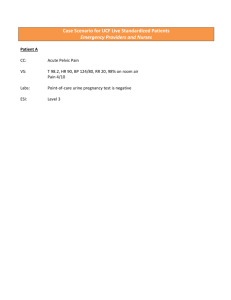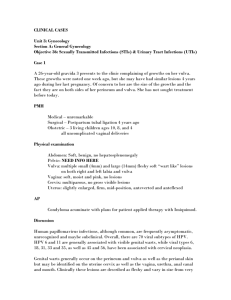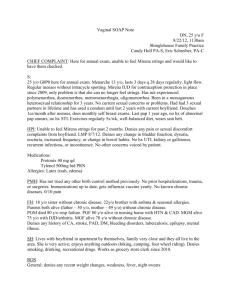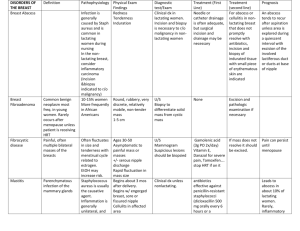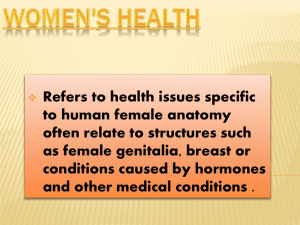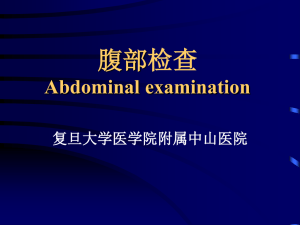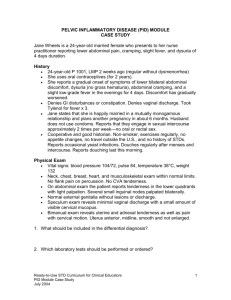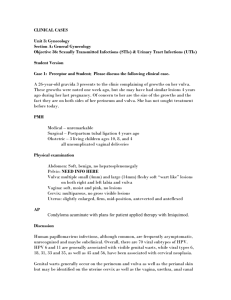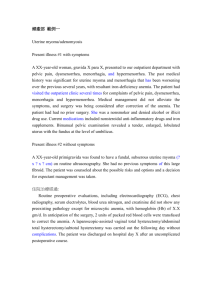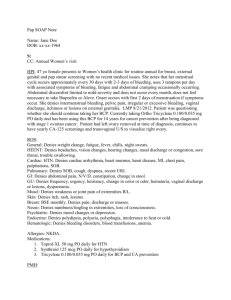Pelvic Note - Lock Haven University
advertisement
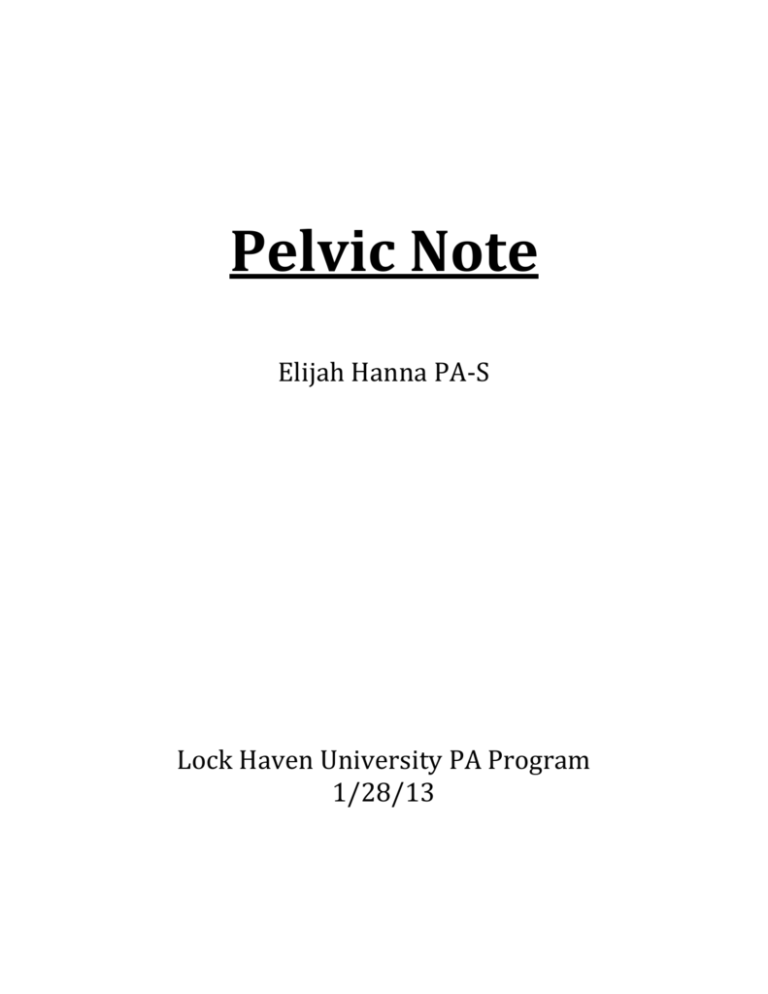
Pelvic Note Elijah Hanna PA-S Lock Haven University PA Program 1/28/13 Name: ****** ***** MRN: ######## Race & Gender: Hispanic Female Insurance: Blue Cross Blue Shield D.O.B.: 11/11/1961 Date: 1/28/13 CC: Annual Gynecological and Breast Exam HPI: Mrs. ***** is a 51-year-old, G2P2 female that presents to the clinic for a well woman check including a manual breast exam, pelvic exam and PAP smear. The patient is a Spanish speaking only woman that requests the use of a translator through the phone. Claims to be in good health and her LMP was 1/10/13 which was consistent with her usual 5 day duration and moderate discharge requiring 3-4 tampons per day. Patient’s only complaint is intermittent, intravaginal dryness that leads to some mild discomfort during intercourse. This has been occurring over the last 3 months and she denies any worsening of the symptoms. Patient has used lubrication, which provided relief during intercourse. Patient denies any vaginal pain without intercourse. Patient denies any dysuria, hematuria, urinary frequency or urgency, feeling of mass or pressure in pelvic area, pelvic pain, vaginal discharge or bleeding, post-coital bleeding, cramping, spotting, vaginal itching, or any inner or outer pelvic lesions. Patient denies any history of or current breast masses, tenderness, skin changes, nipple discharge, changes in breast size or self-breast exams. Patient denies any fatigue, fever, dizziness or lightheadedness, headaches, hot flashes, heat/cold intolerance, cough, shortness of breath, chest pain, palpatations, abdominal pain, nausea, vomiting, diarrhea/constipation, hematochezia or melena. Patient denies any history of sexually transmitted diseases, breast or pelvic diagnoses, or labor complications. Claims to be in a happy, monogamous relationship with her husband with weekly sexual interaction. Last gynecological and breast exam was 1/9/12. PMH: Chronic hypertension which is well controlled with medication. Denies congenital diseases, anemia, osteoporosis, CVA, DM, CAD, clotting or bleeding disorders, pulmonary diseases, gastrointestinal diseases, renal diseases, or cancer. OB/GYN: Patient is premenopausal with monthly menstrual periods as noted in HPI. LNMP 1/10/13, first menses at age 13. G2P2, vaginal deliveries in 1984 and 1987 with no complications. No abnormal PAP smears. Immunizations: Up to date. Gets a yearly influenza vaccine. Denied Gardasil vaccine at last well woman check up. Surgeries: ORIF of fractured ankle in 2009. Appendectomy in 1970’s. Hospitalizations: For appendectomy in 1970’s. Medications: HCTZ 25 mg PO, ASA 81 mg PO, Centrum’s Women’s Health Multivitamin. Allergies: NKDA. Environmental including Ragweed. Family History: Father, Alive at 72-years-old, Hx. of DM type 2 and HTN Mother, Alive at 70-years-old, Hx. of Asthma, HTN, CAD Brother, Alive and well at 54-years-old Sister, Alive and well at 49-years-old Daughter, Alive and well at 28-years-old Son, Alive and well at 25-years-old Social History: Patient is in a happy, monogamous relationship with her husband of 28 years. They have two children that live locally outside their home. Regular, weekly oral and vaginal sexual interaction. Denies any anal intercourse. She works alongside her husband at their local restaurant. Has family and friends in the area providing a strong support group. Patient denies any history of or current alcohol, tobacco, or illicit drug use. She enjoys running her restaurant and watching her grandchildren. Physical Exam: General: Patient is A&O x’s 3. No acute distress. Appears as stated age. Dressed appropriately with no indication of poor hygiene. Spanish speaking only. Vitals: BP-126/84, HR-72, Temperature-98.8 F, Weight- 144 lbs., Height-5’7” Chest/Lungs: No scars, lesions, masses or labored breathing. Symmetrical diaphragmatic excursion and no dullness to percussion. Chest and back are nontender to palpation. Breath sounds clear to auscultation with no wheezes, ronchi, crackles or rales. Cardiac: Visible PMI at the left mid-clavicular line and 5th intercostal space. No palpable thrills. Regular rate and rhythm with normal S1 and S2. No murmurs, clicks, rubs, or gallops. Breast: Symmetrical in size and shape. No visible masses, nipple retraction, erythema, inflammation, dimpling, nodularity, thick/dry skin, or peau d’ orange. Non-tender to palpation with no palpable masses or induced nipple discharge bilaterally. No palpable axillary lymphadenopathy bilaterally. Examined in the sitting in supine positions. Abdominal: No visible scars, lesions, masses, or abnormal pulsations. No abdominal aorta, renal, external iliac, or femoral bruits to auscultation. Bowel sounds heard in all four quadrants at equal intensity. Percussion reveals no hepatosplenomegaly or bladder distension. Non-tender to light or deep palpation with no masses or organomegaly. Pelvic: External genitalia reveals Tanner stage 5 hair distribution. Vulva, labia and perineum without lesions, erythema, ulcerations, masses or tenderness to palpation. Speculum exam reveals pale pink, and slightly dry vaginal mucosa with no discharge, odor, lesions, masses, erythema or inflammation. Parous cervical os noted with no visible lesions, masses, or discharge noted. Cervix is freely mobile with no cervical motion tenderness. Brush and spatula specimens taken. Bimanual exam reveals anteverted, mobile and firm uterus with no masses, lesions, or tenderness. Adnexa was non-palpable and non-tender bilaterally. Rectovaginal exam reveals no masses or tenderness with appropriate sphincter tone and no fecal occult blood. Assessment: Healthy, premenopausal, G2P2 51-year-old female with new onset atrophic vaginitis and chronic hypertension. New atrophic vaginitis could suggest pending menopause. Plan: Pending Labs: PAP smear specimens sent to cytology for analysis. Mammogram ordered for 2/5/13. Referrals/Consults: None Treatment: Suggested OTC Water-Soluble Vaginal Lubricant. Apply as suggested prior to vaginal penetration. Patient Education: Patient educated on atrophic vaginitis and encouraged to use water-soluble vaginal lubrication prior to sex. Advised to not use any non-watersoluble lubricants due to increase in infection rates and insult to sexual prophylactics like condoms or diaphragms. Advised to avoid scented soaps, lotions, perfumes or douches. Educated on correlation with menopause and decreased estrogen levels. Progressive pain, unrelieved symptoms, or new symptoms warrants acute follow up and reevaluation. Told there was more aggressive treatment option such as Premarin Vaginal Cream that may be an option if this treatment option fails. Patient agreed with treatment plan and had no questions or concerns. Patient will receive a letter in the mail with her PAP smear results. We will call if there are any abnormal results. Follow Up: Return to care in 1 year for repeat gynecological and breast exam. Follow up before as needed. Elijah Hanna PA-S (1/28/13)
